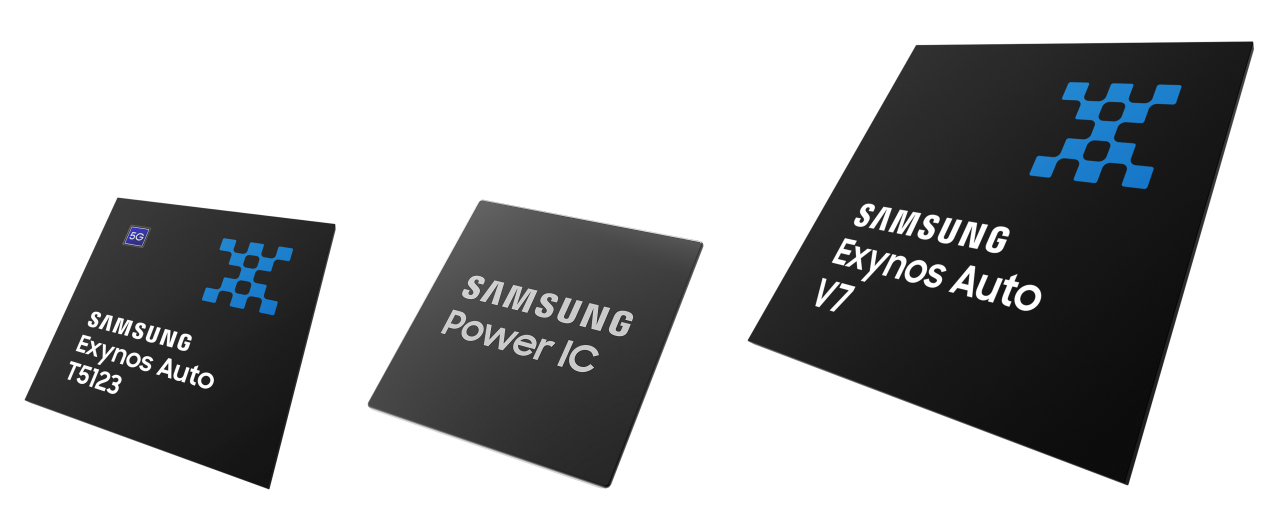
Samsung Electronics said Tuesday it rolled out an automotive semiconductor chip that delivers a fifth-generational network connectivity for in-vehicle infotainment services for the first time in the industry.
The newly-launched telematics control unit for cars, Exynos Auto T5123, aims to provide essential information to a vehicle in real-time via high-speed download speeds of up to 5.1 gigabits per second. Samsung said the new auto chip will allow passengers to enjoy high-definition content streaming services and video calls through the 5G-based vehicle communication.
The new chip is operable in both standalone and non-standalone modes, so that the chip works in conjunction with both 5G and long-term evolution infrastructure. It is currently in mass production, but Samsung declined to name its clients.
Moreover, the unit comes with two Cortex-A55 central processing unit cores by United Kingdom-based semiconductor design firm Arm and a built-in global navigation satellite system, enabling an enhanced telematics applications to track and monitor cars remotely.
Exynos Auto T5123 is one of the three new logic chips unveiled by Samsung Electronics Tuesday, offering faster data transmission, safer in-vehicle infotainment performance and more reliable operation of connected cars.
Along with Exynos Auto T5123, Exynos Auto V7, a processor for in-vehicle infotainment systems mounted on mid-to high-end vehicles, is the latest addition to Samsung Electronics‘ automotive brand processor lineup for a more immersive in-car experience.
Exynos Auto V7’s imaging system provides pixel correction, dynamic range compression and geometric distortion correction for noiseless and distortion-free images used in features like surround view and parking assistance, Samsung said. The new processor will also support multiple systems simultaneously and brings safer operation as it keeps an automotive domain from interfering with one another.
Samsung added Exynos Auto V7 is being used in Volkswagen’s latest in-car application-server 3.1 that was developed by LG Electronics’ vehicle component solutions division.
In the meantime, S2VPS01, Samsung‘s new power management integrated circuit that regulates and rectifies the flow of electrical power, will support a more reliable performance of in-vehicle infotainment system, Samsung also said.
“Smarter and more connected automotive technologies for enriched in-vehicle experiences including entertainment, safety and comfort are becoming critical features on the road,” Park Jae-hong, executive vice president of System LSI Custom SOC Business at Samsung Electronics, said in a statement.
“With an advanced 5G modem, an AI-enhanced multi-core processor and a market-proven power management integrated circuit solution, Samsung is transfusing its expertise in mobile solutions into its automotive lineup and is positioned to expand its presence within the field.”
The new logic chips will help Samsung cope with a growing demand for automotive chip technology solutions, the company said. Market analytics firm IHS Markit in early November forecast the global market for automotive semiconductors to reach $67.6 billion by 2026, showing annual growth rate of about 7 percent from around $40 billion as of end-2020.
Also, a 2019 estimate by Korea Evaluation Institute of Industrial Technology showed that a single car would need about 2,000 semiconductor chips on average by 2022, up sevenfold from 2010, with the advent of commercial level-3 self-driving cars.
The newly-launched telematics control unit for cars, Exynos Auto T5123, aims to provide essential information to a vehicle in real-time via high-speed download speeds of up to 5.1 gigabits per second. Samsung said the new auto chip will allow passengers to enjoy high-definition content streaming services and video calls through the 5G-based vehicle communication.
The new chip is operable in both standalone and non-standalone modes, so that the chip works in conjunction with both 5G and long-term evolution infrastructure. It is currently in mass production, but Samsung declined to name its clients.
Moreover, the unit comes with two Cortex-A55 central processing unit cores by United Kingdom-based semiconductor design firm Arm and a built-in global navigation satellite system, enabling an enhanced telematics applications to track and monitor cars remotely.
Exynos Auto T5123 is one of the three new logic chips unveiled by Samsung Electronics Tuesday, offering faster data transmission, safer in-vehicle infotainment performance and more reliable operation of connected cars.
Along with Exynos Auto T5123, Exynos Auto V7, a processor for in-vehicle infotainment systems mounted on mid-to high-end vehicles, is the latest addition to Samsung Electronics‘ automotive brand processor lineup for a more immersive in-car experience.
Exynos Auto V7’s imaging system provides pixel correction, dynamic range compression and geometric distortion correction for noiseless and distortion-free images used in features like surround view and parking assistance, Samsung said. The new processor will also support multiple systems simultaneously and brings safer operation as it keeps an automotive domain from interfering with one another.
Samsung added Exynos Auto V7 is being used in Volkswagen’s latest in-car application-server 3.1 that was developed by LG Electronics’ vehicle component solutions division.
In the meantime, S2VPS01, Samsung‘s new power management integrated circuit that regulates and rectifies the flow of electrical power, will support a more reliable performance of in-vehicle infotainment system, Samsung also said.
“Smarter and more connected automotive technologies for enriched in-vehicle experiences including entertainment, safety and comfort are becoming critical features on the road,” Park Jae-hong, executive vice president of System LSI Custom SOC Business at Samsung Electronics, said in a statement.
“With an advanced 5G modem, an AI-enhanced multi-core processor and a market-proven power management integrated circuit solution, Samsung is transfusing its expertise in mobile solutions into its automotive lineup and is positioned to expand its presence within the field.”
The new logic chips will help Samsung cope with a growing demand for automotive chip technology solutions, the company said. Market analytics firm IHS Markit in early November forecast the global market for automotive semiconductors to reach $67.6 billion by 2026, showing annual growth rate of about 7 percent from around $40 billion as of end-2020.
Also, a 2019 estimate by Korea Evaluation Institute of Industrial Technology showed that a single car would need about 2,000 semiconductor chips on average by 2022, up sevenfold from 2010, with the advent of commercial level-3 self-driving cars.



















![[Today’s K-pop] Treasure to publish magazine for debut anniversary](http://res.heraldm.com/phpwas/restmb_idxmake.php?idx=642&simg=/content/image/2024/07/26/20240726050551_0.jpg&u=)